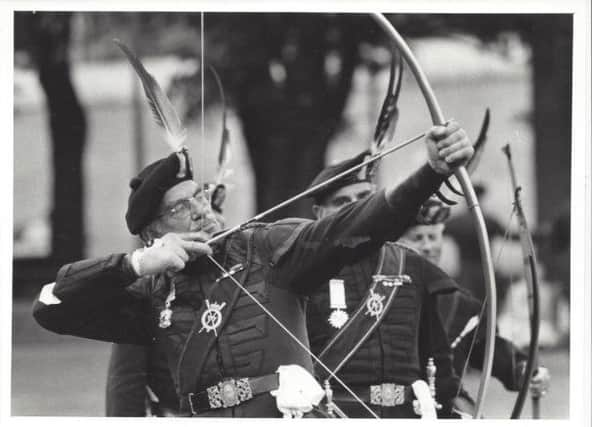Obituary: Dr Paul Mackenzie TD CStJ, soldier, GP and sports medicine pioneer


Medical man, military man, sportsman: Paul Mackenzie was so much more than the sum of his parts.
A boy who could not achieve his dream of becoming a naval medic, due to the weakness of his eyesight, made up for the disappointment by joining the army, serving under Lord Mountbatten during the Second World War, then qualifying as a doctor at the relatively advanced age of 33 and running a rural GP practice single-handedly whilst pioneering modern sports medicine for golfers and skiers, among others.
Advertisement
Hide AdAdvertisement
Hide AdAdd to that his founding of the Glenshee Ski Rescue Service, membership of the Territorial Army and the Royal Company of Archers, the Queen’s Bodyguard in Scotland, and a man emerges who was not only big in stature socially and physically, but confidently at ease with himself and his ability to inspire and achieve.
Yet he had not had the easiest of starts in life. The son of a decorated professional soldier, he and his younger brother were brought up by their mother, Mamie, after the death of his father when young Paul was just six years old. His father, Lionel Do Amaral Mackenzie, the son of a Scots businessman and a South American countess, had been born in Rio de Janeiro and went on to become a major in the Gordon Highlanders, winning the Distinguished Service Order and the Military Cross. He died at the age of 36 of an insulin overdose administered to treat his diabetes.
Educated at Edinburgh Academy where he joined the Officer Cadet Training Unit, Mackenzie joined the army on leaving school in 1938, most likely as a result of his father’s distinguished military career.
He was commissioned in the Border Regiment and served in various campaigns throughout the Second World War, rising to the rank of captain. He ended the war as a junior staff officer in Admiral Lord Louis Mountbatten’s South East Asia Command in Burma, though that was not the end of his military career. He continued to be involved, through the Territorial Army, as a major in the Royal Army Medical Corps, and was awarded the Territorial Decoration for long service.
Meanwhile, having been demobbed in 1946, he embarked on a medical degree at Edinburgh University.
He was 27 and graduated in 1952, the same year he met the woman whose support and dedication would help him establish and sustain a remarkable medical career.
Barbara Ashmead-Barlett was working for a London theatre group when she met him on a trip to Edinburgh. He subsequently moved south, to a number of hospital and locum posts, partly to spend time with Barbara.
When he got the chance to join a medical practice with Dr James Campbell in Bridge of Earn, near Perth, the couple returned north and were married at St Giles’ Cathedral in Edinburgh in 1956.
Advertisement
Hide AdAdvertisement
Hide AdThey initially lived at Mayfield, Forgandenny, and, on the death of Dr Campbell and with the support and partnership of his wife, Mackenzie became a traditional, lone GP.
He was dedicated to serving his community – attending his patients whenever they needed him, regardless of the time, and often repeatedly on the same night.
Along with others, such as the local Scout community, and with the encouragement and support of Sir Andrew Murray, Prior of the Order of St John, Mackenzie established the Glenshee Ski Rescue Service in rural Perthshire. As a successful competitive skier and the medical officer of the Dundee Ski Club, he had a life-long interest in the sport and the initiative provided a much-needed facility in the area.
The Territorial Army, through the Royal Army Medical Corps at Dundee, also helped and the Glenshee model, which ensured serious injuries were responded to effectively, paved the way for similar services elsewhere.
Mackenzie was also involved in studies which confirmed that lower limb fractures related to ski bindings not being adjusted according to the weight and competence of skiers. Later, he played a significant role in the International Ski Safety Society.
A member of the Royal & Ancient Golf Club, he helped the club provide medical facilities for major golf championships, including The Open, and organised, equipped and ran them from 1972 to 1992. The services were supplied by volunteer doctors, paramedic and physiotherapy colleagues and today’s service can be traced back to his model.
An excellent organiser and motivator, able to galvanise others into action, he was also a medical officer to Edinburgh Capital Ice Hockey team and Go-Cart Racing, Scotland, and a founder member of the British Association of Sports Medicine.
In 2007 he was awarded Fellowship of the Faculty of Sports and Exercise Medicine, in recognition of his legacy to modern sports medicine.
Advertisement
Hide AdAdvertisement
Hide AdMackenzie had skied since the age of 10 and remained a skier into his late 80s, usually at Arosa in Switzerland and Lech, in Austria, where he stayed at the hotel of his close friend Othmar Schneider, a former Olympic gold medallist.
Mackenzie was also an enthusiastic member of the Royal Company of Archers, of which he was honorary surgeon before retiring from medicine and, over the years won 27 archery trophies, including The Musselburgh Arrow, The Selkirk Arrow, The Pinkie Pin and The Queen’s Prize.
A bon viveur and gourmet, who savoured his long life and did so much to improve the lives of others, Mackenzie is survived by his wife Barbara, daughter Fiona and son Ruari.